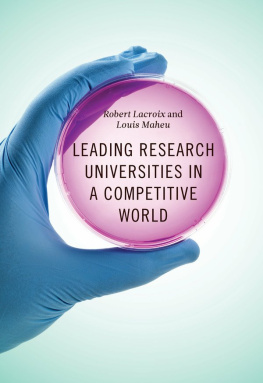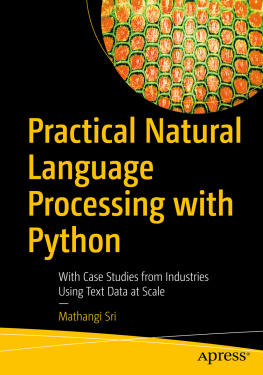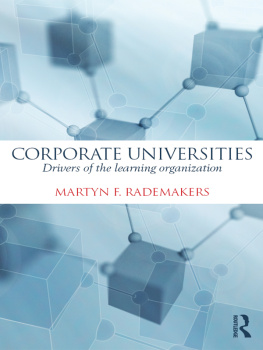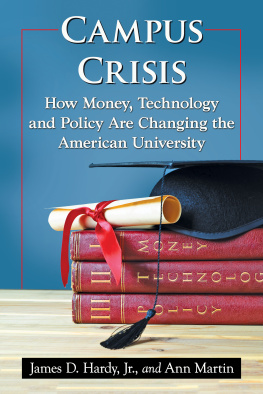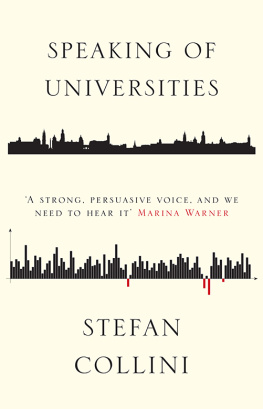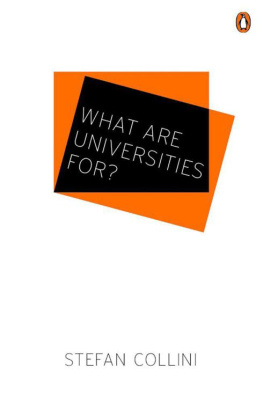Title page
How Universities Can Help Create a Wiser World
The Urgent Need for an Academic Revolution
Nicholas Maxwell
SOCIETAS
essays in political
& cultural criticism
imprint-academic.com
Publisher information
Copyright Nicholas Maxwell, 2014
2014 digital version by Andrews UK Limited
www.andrewsuk.com
The moral rights of the author have been asserted.
No part of this publication may be reproduced in any form without permission, except for the quotation of brief passages in criticism and discussion.
Originally published in the UK by
Imprint Academic, PO Box 200, Exeter EX5 5YX, UK
Originally distributed in the USA by
Ingram Book Company,
One Ingram Blvd., La Vergne, TN 37086, USA
Quotation
Reason, of course, is weak, when measured against its never-ending task.
Albert Einstein
Dedication
To Christine van Meeteren
Chapter 1: The Basic Idea
Global Crises
The future of humanity is threatened by grave global problems. There is the problem of war, over one hundred million people having been killed in countless wars during the course of the twentieth century (which compares unfavourably with the twelve million or so killed in wars during the nineteenth century). And we have not done very well so far in the 21 st century. There is the obscenity of the arms trade, the massive stockpiling of armaments, even by poor countries, and the ever present threat of their use by terrorists or in war, whether the arms be conventional, chemical, biological, or nuclear. There is the sustained, profound injustice of immense differences in wealth around the globe, the industrially advanced first world of North America, Europe, and elsewhere experiencing unprecedented wealth while something like a third of humanity live in conditions of abject poverty in the third world, hungry, unemployed, without proper housing, health care, education, or even access to safe water. There is the long-standing problem of the rapid growth of the worlds population, pronounced especially in the poorest parts of the world, and adversely affecting efforts at development. And there is the horror of the AIDS epidemic, again far more terrible in the poorest parts of the world, devastating millions of lives, destroying families, and crippling economies. There is the problem of the progressive destruction of tropical rain forests and other natural habitats, with its concomitant devastating extinction of species. Humanity urgently needs to discover how to create a sustainable world industry and agriculture that does not wreak havoc on the environment; attempts do this have, so far, proved ineffective. There are problems of pollution of air, sea, and earth, and problems of depletion of finite resources. And over everything hangs the menace of climate change, threatening to intensify all the other problems apart, perhaps, from population growth. (As the climate warms, millions will die. They are dying already.)
Finally, there is what Ronald Higgins, decades ago, called the seventh enemy: our ingrained incapacity to do what needs to be done to solve our problems.
But it is worse than that. It is not just that our efforts to tackle global problems seem pathetically inadequate. Far worse, much of our efforts seem devoted to intensifying our problems. We know that if we continue to emit carbon dioxide at anything like the rate we do at present, we are heading towards disaster. Does this mean we cut back on emissions? All sorts of measures are introduced, but CO emissions actually increase or only fail to increase because of the world economic recession. High up on the agenda of every government of every nation is economic growth; but it is economic growth, as conducted at present, which leads to higher CO emissions even if this need not be if power, industry, and transport were run on different, more sustainable lines.
Governments seek security, build up their armies and defence in order to procure security, provoke suspicious neighbour nations to do likewise, and thus increase insecurity and the danger of war.
Banks seek wealth, and plunge the world into debt, recession, and poverty.
Progress is eagerly sought, and the outcome is industrial, agricultural, and population growth beyond what the planet can support. Natural habitats are destroyed, species annihilated, land and sea polluted.
We seem trapped in a vicious nightmare in which what we strive to achieve, our finest and most passionately sought aspirations and ideals, are transformed, as we draw closer to them, into ugly and dangerous monstrosities, threats to our very existence. What we love the most turns out to do us the most harm.
A key example of this nightmare twist is science. Modern science has been pursued, ever since its birth in the 17 th century, with the passionate conviction that science will better the lot of humanity. Unquestionably, science has met with quite astonishing intellectual success in improving our knowledge and understanding of the universe, and ourselves as a part of the universe. And modern science and technology have been of immense benefit to humanity. In countless ways, those of us fortunate to live in the wealthy, industrially advanced parts of the world have had our lives enriched beyond the wildest dreams of people living only a couple of centuries ago. Modern science has made possible the modern world.
At the same time, science has helped to create all our current global problems or at least has made them possible. Science and technology have led to modern industry, agriculture, transport, armaments, medicine, and hygiene. And these in turn have led to global warming, population growth, destruction of natural habitats and rapid extinction of species, the development of extreme inequalities of wealth and power around the globe, pollution of earth, sea, and air, depletion of natural resources, the lethal character of modern war, the increasing threats posed by the spread of modern armaments, and even the AIDS epidemic AIDS being spread by modern travel.
But it is not just that modern science has made all our global crises possible. It is worse than that. The unprecedented success of modern scientific and technological research is actually the cause of our global problems.
At once it will be objected that it is not science that is the cause, but rather the things that we do , made possible by science and technology. This is obviously correct. But it is also correct to say that scientific and technological progress is the cause. The meaning of cause is ambiguous. By the cause of event E we may mean something like the most obvious observable events preceding E that figure in the common sense explanation for the occurrence of E. In this sense, human actions (made possible by science) are the cause of such things as people being killed by modern weapons in war, destruction of tropical rain forests. On the other hand, by the cause of E we may mean that prior change in the environment of E which led to the occurrence of E, and without which E would not have occurred. If we put our times into the context of human history, then it is entirely correct to say that, in this sense, scientific-and-technological progress is the cause of our distinctive current global disasters: what has changed, what is new, is scientific knowledge, not human nature. Give a group of chimpanzees rifles and teach them how to use them and in one sense, of course, the cause of the subsequent demise of the group would be the actions of the chimpanzees. But in another obvious sense, the cause would be the sudden availability and use of rifles the new, lethal technology. Yet again, from the standpoint of theoretical physics, the cause of E might be interpreted to mean something like the physical state of affairs prior to E, throughout a sufficiently large spatial region surrounding the place where E occurs. In this third sense, the sun continuing to shine is as much a part of the cause of war and pollution as human action or modern science and technology.
Next page


